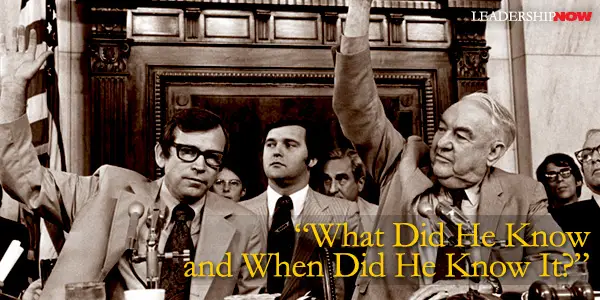 Leading Blog | Posts by Month |
 Leading Blog | Posts by Month |
11.30.11

LeadershipNow 140: November 2011 Compilation
Posted by Michael McKinney at 04:14 AM
11.24.11

Finding Gratitude in the Common Things
We can only be said to be alive in those moments when our hearts are conscious of our treasures. Sometimes we have big and uncommon things to be thankful for, but mostly what we have to be thankful for is daily, common and mundane. It’s these daily blessings that we take for granted. It’s these that we need to be most thankful for and learn to find ways to express our gratitude for—daily. Gratefulness is a state of mind. Gratitude puts us more in the moment rather than being shackled to the past. Without an attitude of gratitude, we tend to focus on the wrong things. It makes us do things we shouldn’t do. Gratitude assigns meaning to that which we find common, but is, in fact, a gift. At the same time, it gives us meaning. Often it is not until we are deprived of something that we begin to appreciate that which we take for granted. It is easy to be oblivious to that which we have until we lose it or face the prospect of losing it. Do we have to suffer a loss to appreciate that which we have?
Posted by Michael McKinney at 12:01 AM
11.22.11

6 Concepts for Creating What People Love Before They Know They Want ItDemand is created in the gaps between what we really want and the goods and services we settle for. “Demand creators figure out how to solve the big and little hassles we all face—and they make our days easier, more convenient, more productive, and simply more fun,” writes Adrian Slywotzky in Demand.Slywotzky has identified six insights and behaviors of demand creators: Make it Magnetic. Demand creators begin with a very tough realization: Very Good does not equal Magnetic. When it comes to creating demand, it’s not the first mover that wins; it’s the first to create and capture the emotional space in the market. Fix the Hassle Map. Mapping the hassles that dominate so much of daily life, and then figuring out how to fix them, provides the path to explosive potential demand. Build a Complete Backstory. What you don’t see is often what makes or breaks the product. Backstory is the unseen, often overlooked factors, including infrastructure, ecosystem, and business design, that are essential to creating demand. Why did Sony’s Librié fail and Amazon’s Kindle succeed even though it was launched three years before the Kindle using the same technology? Find the Triggers. The biggest obstacles to creating demand are inertia, skepticism, habit, and indifference. Finding the trigger to get people to act may take years, but great demand creators constantly search for them, always experimenting to find what turns fence-sitters into customers. Build a Steep Trajectory. Even on launch day, demand creators ask themselves a very simple question: How fast can we get better? They know that every improvement they make—technical or emotional—will unlock new layers of demand, and leave less open space for imitative, piggybacking competitors. De-Average. Demand creators know that the “average customer” is a myth. They allow for variation. The de-average by finding efficient, cost-effective ways to create product variations that more perfectly match the varying needs of very different types of customers, getting rid of overages (things we don’t want) and underages (gaps we want filled). Most project launches fail because we fail to overcome our own human nature. We think the odds of success are pretty good. But we’re wrong. “Launch is a mind game. Success and failure hinge on how people think, and the degree to which they can overcome business as usual—and the innate proclivities of human nature.” Slywotzky offers these seven habits to help you with the odds of a successful launch:
The next time you are experiencing a hassle or frustration and wonder where we will find the demand to make the change that needs to be created or implemented, Slywotzky encourages not to look up; look in the mirror.

Posted by Michael McKinney at 12:36 PM
11.16.11

We Blame the 1%, But Still Call Them Our Leaders Approval ratings have consistently hovered at historic lows for both American political parties for years. Thousands have organized in angered protests on a near monthly basis to express their distrust and impatience with the political and economic elite, spanning stark polarities of social groups like the Occupy Wall Street movement and the Tea Party. As his own approval ratings have fallen toward the abysmal ratings of former President George W. Bush—and with the 2012 Presidential Election now looming -- the inspired election of President Obama certainly feels like ancient history. Clearly, the deep leadership problem that is wreaking havoc throughout our modern world is neither a Republican nor Democrat problem. The real problem, as I contend in my new book Lead Without Followers: How to Save Our World by Radically Redefining the Meaning of Leadership, is that we have collectively, quietly, even subconsciously lost sight of what it really means to lead—the essential, fundamental, unshakeable human core of what leadership is, amongst and on behalf of others. My book is a radical redefinition of leadership. By that, I mean to encourage you to rethink the very relation between a leader and followers. At first glance, we would all deduce that if you have no followers, you cannot lead, because you have no one to lead. A quote that I often hear attributed to John C. Maxwell goes something to the effect of, "If you think you're a leader but no one is following you, you are just a guy going for a walk." This is the highly constrained, indisputable law of today's definition of leadership. But what about what you do when you're on that walk? Do you come across others? Get presented with an opportunity to do good, do wrong, or resort to indifference? Become a hero or one of many bystanders who did nothing to help? Lend a hand? Offer a smile? Nobody lives in a bubble. In our lives, we encounter countless dozens, if not hundreds, if not thousands of lives. Each seemingly routine and mundane interaction—even with a complete stranger you'll never see again—is an opportunity to positively, negatively, or neutrally impact his or her life, potentially forever. To me, simply living in this world and among its peoples gives you the raw opportunity to become a bona fide leader. By simple choice, with some internal exploration, personal growth and everyday practice, you can become a highly influential leader that positively impacts the lives of others, every day—even without followers. I argue in my book that "leadership" has become a far too limited term that is more accurately used to define the material wealth and career success of individuals among society—those who have succeeded in acquiring high salary, prestigious job title and social status, perceived popularity and power, and masses of followers. On a subconscious level, we socially acknowledge these qualifiers of material success as indicators of an individual's supposed ability to lead. Of course, making the assumption is matter simple logic: to rise to such a level of success, one has proven his or her intelligence and abilities—important necessities for leadership on business and political levels. However, today, and especially as popular protests lambast the supposed "1%" of corrupt politicos and evil big bankers, have we quietly grown into investing far too much attention into the things that individuals have acquired—wealth, status, power, followers, etc.—to shallowly qualify them as the best potential leaders for our world? Leadership today has become a dirty word. "Politician" is even dirtier. And as public rage swirls at the simple, commonplace status quo amongst the national zeitgeist, what it means to be a leader is becoming further convoluted. If we are truly dedicated to changing what we see as wrong with our world and feel it necessary to inspire a new generation of leaders to help turn things around, we owe it to ourselves to take a good, hard, long look at how we each define leadership in its typically constrictive terms. Maybe, just maybe, if we place renewed focus and energy into defining leadership more upon what drives us to do good—passion and inspiration, love and selfless giving, vision and dedication, positivity and hope—than the socially-admired material outcomes, we'll more quickly arrive at the solution. Not everyone can lead as a CEO of a Fortune 500 company. There can only be one President of the United States. But everyone, in as little as being human, can take up the vital mantle of leadership in their every day lives based upon everything that they already have—even without followers. Dave Ursillo is a former “politico” insider turned alternative leadership writer, author and speaker. The Rhode Island native teaches men and women how to become “leaders without followers” in any walk of life by discovering a personal and profound sense of inner leadership. At 23, Ursillo abandoned his fast-tracked career path in public service amid a crisis of identity and while battling depression. Opting for the unemployment line during a 100-year recession, Ursillo has built an expansive digital platform through a growing social media presence and as an avid writer, helpful personality and determined world-changer. Ursillo’s experiences from “his past life” span five governmental offices over six years from 2003 to 2009, including the White House Council on Environmental Quality under the Bush Administration in 2008 and as a “body man” to a state gubernatorial candidate in 2009. Since its inception in 2009, DaveUrsillo.com has reached over 70,000 readers from 173 countries. In June 2011, Ursillo and his blog were also seen in a feature story on CBS Sunday Morning about the world of blogging.
Posted by Michael McKinney at 05:17 PM
11.14.11

Do You Have Moral Overconfidence?In a recent Bloomberg Businessweek article, Harvard Business School Dean, Nitin Nohria stated that because we all suffer from “moral overconfidence,” the most important thing business schools could be teaching is humility. He writes:Many people view “character” as an immutable trait formed during childhood and adolescence. I believe character development is similar to the development of knowledge or wisdom—it’s a lifelong process. The world isn’t neatly divided into good people and bad people. Most will behave well or poorly, depending on the context….Business leaders need to remember that most of us have too much confidence in our strength of character.Nohria is exactly correct. Good leadership is humble leadership. Humility is living in truth. The truth about our limitations and an understanding of our proper relationship with others. And do we share with each other a moral overconfidence—a certain naiveté about ourselves that carries with it the seeds of our own destruction. Humility gives us a better understanding of how we are to treat each other. Without it we operate from only one perspective—our own. This kills influence. As leaders, we are to work with people, not over them. It is far too tempting to think hierarchically and not relationally. In Leading Without Power, Max De Pree says that “Leaders belong to their followers.” Too many leaders try to create a buffer between themselves and their followers, when instead, they need to be leading from among their followers. A humble leader will close the gap between themselves and others. Humility manifests itself in understanding the need to learn. Authority disciplined by humility is teachable. It is arrogant to think that once we have the position or a title, we’ve arrived. We never arrive. It is merely an opportunity to learn from another perspective. If you stop learning, you stop leading. It’s something we need to stay on top of because if we don’t, life has a way of bringing us up short in an effort to get us to wake-up and start learning. Leadership has a way of revealing our weaknesses.
Posted by Michael McKinney at 04:07 PM
11.11.11

What Did He Know and When Did He Know It?
SENATOR Howard Baker’s famous question, "What did the president know and when did he know it?" is about moral responsibility. Leaders have a moral responsibility to the people they serve. Those relationships are a leader’s stock in trade and are to be valued above our agendas. For it is through the relationships we develop that we are able to accomplish anything at all. Our actions set the tone for the whole team. They express our values and our priorities. Above all leadership is something we live. It’s easy to get trapped in the agenda and forget why we are leading in the first place. The agenda is very visible and exciting. Lost in the agenda, we forget who we are and those we serve. We can be so focused on the goal that we forget the process. We move so fast we can’t hear our own values. We have to slow down so that our values catch up with our behavior. If we don’t, we make poor judgments, we misplace our loyalties, confuse priorities, and forget the well-being of the people we lead and the example we provide. In short, we ask the wrong questions and so we get the wrong answers. Before we choose to lead and throughout our leadership journey, we need to ask who we are and why we lead? It is that inescapable core that determines our behavior.
Posted by Michael McKinney at 05:16 PM
11.09.11

Uncertainty Will Freeze You in Place if You Let It
AMBIGUITY is not only certain; it is a necessary state for advancing. Jonathan Fields writes, in Uncertainty: “The more you’re able to tolerate ambiguity and lean into the unknown, the more likely you’ll be to dance with it long enough to come up with better solutions, ideas, and creations.” The problem is that most of us, to one degree or another, react so strongly to ambiguity or uncertainty, that it becomes a limiting factor in our lives and stops us from acting in the face of it. The issue is not so much failure as it is not wanting to “be judged for taking the less-mainstream path and coming up empty.” But taking the risk in the face of uncertainty is “not about tempting fate, it’s about going to that place where magic happens.” Living in the question. So how do we push forward when everything seems to be spinning out of control? Fields suggests we first find our certainty anchors. Certainty anchors are rituals and routines that we build into our lives that help to counter the resistance. On those occasions when you find that it is “Twitter-Time,” rituals and routines will help move the process along. “Ritual helps train you to sit down when you most want to stand when you’re forced to work on the part of the process that leaves you anywhere from bored to riddled with anxiety.” Get feedback along the way. Build a hive of heroes, mentors, and champions. Consider ways to bring into the process the very people you are creating for. Train your brain in the art of focused awareness through meditation, mindfulness, visualization, and exercise to stay focused and grounded. Randy Komisar, author of The Monk and the Riddle, told Fields: It’s a process of stripping myself bare of all the pressures, all of the barnacles that accumulate around you every day as you interact in the world—the pressures, the expectations, the ego, the things that ultimately make your vision unclear. Exercise in the list above wasn’t an afterthought. Most of us feel we don’t have time to work out. But we really can't afford not to. Fields writes: Studies now prove that aerobic exercise both increases the size of the prefrontal cortex and facilitates interaction between it and the amygdala. This is vitally important to creators because the prefrontal cortex, as we discussed earlier, is the part of the brain that helps tamp down the amygdala’s fear and anxiety signals. I emphasize this a lot on the Leading Blog, but I think it’s something we really have to work at. Randy Nelson, Pixar’s former head of education said, “The core skill of innovators is not failure avoidance, it’s error recovery.” Fields adds, “When that’s baked into your creative culture on all levels, people become more empowered to lean into the creative abyss—and magic tends to happen.”

Posted by Michael McKinney at 06:39 PM
11.07.11

3 Self-Limiting Mindsets that Will Hold You Back at Work
THE workplace has enough challenges and obstacles without us getting in our own way. But too often, we sabotage ourselves. Whether it’s internal forces that cause us to sell ourselves short or it’s a matter of having been conditioned not to “toot our own horn,” people have a marked tendency to avoid the limelight when in truth, they belong in it. What’s more, if you’ve always been the ‘unsung hero,’ management wants to know who you are. In my executive coaching business, I’ve worked with scores of clients over the years to help them overcome self-limiting mindsets that were holding them back in the workplace. Here are some of the most common issues:
Remember, if you don’t take credit for your own success, someone else will. That doesn’t serve your own interests. And if you think about it, it doesn’t serve the long-term interests of the company. You have a professional duty to yourself as well as your company to make sure your accomplishments are recognized and credited to you.  
Posted by Michael McKinney at 10:11 AM
11.06.11

I, Steve: Steve Jobs in His Own Words George Beahm has compiled a collection of Steve Jobs quotes in I, Steve. Organized by topic, this is a great (and sourced) collection. Here are a few:
George Beahm has compiled a collection of Steve Jobs quotes in I, Steve. Organized by topic, this is a great (and sourced) collection. Here are a few:
• I would trade all my technology for an afternoon with Socrates.

Posted by Michael McKinney at 07:32 AM
11.04.11

If You Will Lead ... WellIf You Will Lead by Doug Moran, is a good book for reading chapter by chapter and stopping to reflect on each one. Based on Kipling’s poem “If–,” Moran has created the “If” Sixteen Leadership Framework to help us answer four important questions:1. Who am I, and what do I believe? 2. What do I want? 3. How will I attract and motivate others? 4. How will I earn and retrain the privilege to lead? Combining historical lessons with examples of his contemporaries, Moran effectively communicates the sixteen attributes: character, authenticity, integrity, self-efficacy, ambition, vision, boldness, resilience, inspiration, courage, selflessness, stamina, composure, patience, enthusiasm, and accountability. Leadership is a choice and how well you will lead is up to you. “The greatest uncertainties associated with leadership,” writes Moran, “are how we use the skills and abilities we have, how hard we work to acquire and build those we don’t, and how well we create positive change by inspiring and motivating others. We reduce the uncertainty by becoming more aware of what it takes to lead well. We reduce uncertainty further by choosing to invest and commit ourselves to our development.”

Posted by Michael McKinney at 03:58 PM
11.02.11

Leading Views: You Can’t Do It Without Love In
Up, Down, or Sideways, Mark Sanborn asks: In
Up, Down, or Sideways, Mark Sanborn asks:
So how are you doing with love? One method I use to assess myself in this area is to plug my name into a familiar passage from the Bible—1 Corinthians 13:4-7. It says, “Love is patient, love is kind. It does not envy, it does not boast, it is not proud. It does not dishonor others, it is not self-seeking, it is not easily angered, it keeps no record of wrongs. Love does not delight in evil but rejoices with the truth. It always protects, always trusts, always hopes, always perseveres.”Replace the word love (and the pronouns that represent it) with your name, and if you’re like me, it will convict you and challenge you.
Posted by Michael McKinney at 01:20 PM
11.01.11

First Look: Leadership Books for November 2011Here's a look at some of the best leadership books to be released in November.




For bulk orders call 1-800-423-8273  Build your leadership library with these specials on over 120 titles. All titles are at least 40% off the list price and are available only in limited quantities. Jacqueline Kennedy on JFK: "He’d read walking, he’d read at the table, at meals, he’d read after dinner, he’d read in the bathtub, he’d read—prop open a book on his desk—on his bureau—while he was doing his tie. You know, he’d just read a little, he’d open some book I’d be reading, you know, just devour it. He’d really read all the times you don’t think you have time to read."
Posted by Michael McKinney at 11:30 AM
|
BUILD YOUR KNOWLEDGE


How to Do Your Start-Up Right STRAIGHT TALK FOR START-UPS 
Grow Your Leadership Skills NEW AND UPCOMING LEADERSHIP BOOKS 
Leadership Minute BITE-SIZE CONCEPTS YOU CAN CHEW ON 
Classic Leadership Books BOOKS TO READ BEFORE YOU LEAD |
|